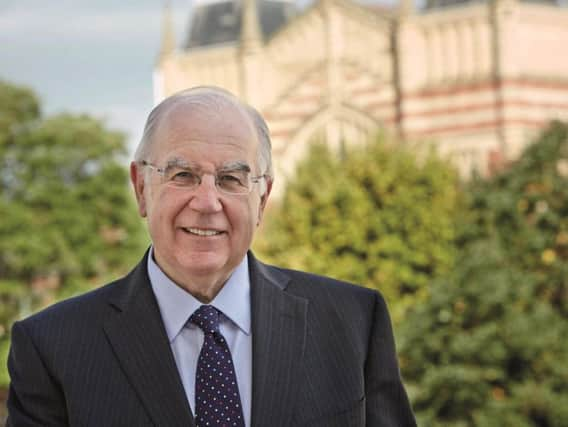BREXIT ANALYSIS: University of Leeds will continue to attract Europe's 'brightest and best minds', says vice-chancellor


Sir Alan Langlands stressed that the university’s determination to attract and welcome talented people from around the world was “undiminished” by the impending declaration of Article 50 this afternoon.
He said: “We are an international university in a vibrant and compassionate city that looks outwards, and is home to some of the brightest and best minds from across Europe – people who have settled here and contribute to the health and well-being of their fellow citizens. This helps ensure our academic success and contributes a great deal to the economic, social and cultural development of the city of Leeds, the region and beyond.
Advertisement
Hide AdAdvertisement
Hide Ad“We will do everything in our power to make sure this continues to be the case and that Leeds continues to be an attractive and welcoming destination for students and staff from around the world.”
Sir Alan also expressed concerns over the uncertainty surrounding the impact it would have on higher education and stressed the importance of universities being at the heart of designing the Brexit strategy.
He said: “The Prime Minister has previously spoken positively about the value of science and research, and the importance of continuing to welcome people from across the world to work in our universities and cutting-edge industries. But her rhetoric needs to be followed up quickly by practical action.
“We must keep up the pressure to ensure the voice of higher education – as a driver of skills and growth – is clear and consistent, and supported by our political representatives and industry partners.
Advertisement
Hide AdAdvertisement
Hide Ad“As the Government’s longer-term position crystallises, the university will continue to nurture EU research projects and student exchanges and maintain the many important contributions made by students and academics from EU member states.”
European students at the university said they shed a tear following the referendum and didn’t think Brexit would actually happen.
Fiona Holland, second year history of art student, who is of Belgian-Irish nationality, said: “ Until I began studying at Leeds University in 2015, my entire life had been spent in Belgium, in Brussels, the epicenter of all EU activity. Both my parents had moved to the city from Ireland in the late 1970s and early 1980s, and have worked at the institution ever since. There is absolutely no doubt that I still support what the European Union is and does. It is impossible for me not to.
"I’m going to be honest here; I did shed a few tears last summer on June 24. I seriously surprised myself that morning, as I’m not one to usually follow or care about politics at all. The public vote, I had hoped, would have proved that the country I now call my second home was not going to let go of their ties with Europe.
Advertisement
Hide AdAdvertisement
Hide Ad"With Article 50 being triggered today, Britain’s divorce from Europe now seems all the more legitimate. It might sound ridiculous, but for just a little while, Brexit still seemed like a dream to me that would fizzle out and be forgotten by September.
"Initially, Brexit really scared me as I felt I wasn’t welcome in Britain anymore. After graduating, I would be just one those European foreigners stealing jobs and diminishing British sovereignty. In reality, I am still unsure of whether or not I will stay in the UK after graduation. For the moment, however, what keeps me hopeful is the sheer number of millennials around me that supported a relationship with the European Union last June. The EU has enabled me to live a life in Brussels and Leeds. I wouldn’t change it for the world, so I hope Brexit doesn’t either."
Bulgarian Peter Hristov, first year masters in mathematics and computer science, added: “The triggering of Article 50 today makes Brexit seem a lot more real. Up until now it seemed like something vague in the distance that may or may not happen. I first came to the UK three years ago on the Erasmus student exchange program, an amazing opportunity for students to experience life in another country. I would be greatly saddened if Brexit interrupted this exchange of cultures, ideas and education. I am now studying for my MA in Leeds, before I move on to my PhD next year.
"I am here because I speak the English language and living standards are far superior than those where I’ve come from. Many people voted for Brexit to prevent “foreigners” from exploiting opportunities in the UK that native people are privileged to have. From my personal experience this is rarely the case. People who come here either work and pay taxes, or study and contribute to the academic institutions in which they’re based. Talent has no religion, nation or race. Brexit has dissuaded me from staying in the UK and I will most probably leave when I have finished my education."